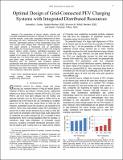Optimal Design of Grid-Connected PEV Charging Systems With Integrated Distributed Resources
Author(s)
Perreault, David J.; Gunter, Samantha Joellyn; Afridi, Khurram
DownloadGunter Optimal Design.pdf (2.108Mb)
OPEN_ACCESS_POLICY
Open Access Policy
Creative Commons Attribution-Noncommercial-Share Alike
Terms of use
Metadata
Show full item recordAbstract
The penetration of plug-in electric vehicles and renewable distributed generation is expected to increase over the next few decades. Large scale unregulated deployment of either technology can have a detrimental impact on the electric grid. However, appropriate pairing of these technologies along with some storage could mitigate their individual negative impacts. This paper presents a framework and an optimization methodology for designing grid-connected systems that integrate plug-in electric vehicle chargers, distributed generation and storage. To demonstrate its usefulness, this methodology is applied to the design of optimal architectures for a residential charging case. It is shown that, given current costs, maximizing grid power usage minimizes system lifecycle cost. However, depending upon the location's solar irradiance patterns, architectures with solar photovoltaic generation can be more cost effective than architectures without. Additionally, Li-ion storage technology and micro wind turbines are not yet cost effective when compared to alternative solutions.
Date issued
2013-06Department
Massachusetts Institute of Technology. Department of Electrical Engineering and Computer ScienceJournal
IEEE Transactions on Smart Grid
Publisher
Institute of Electrical and Electronics Engineers (IEEE)
Citation
Gunter, Samantha J., Khurram K. Afridi, and David J. Perreault. “Optimal Design of Grid-Connected PEV Charging Systems With Integrated Distributed Resources.” IEEE Transactions on Smart Grid 4, no. 2 (n.d.): 956–967.
Version: Author's final manuscript
ISSN
1949-3053
1949-3061